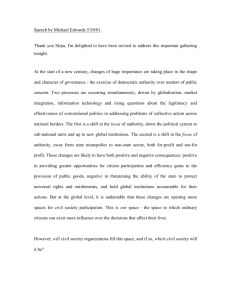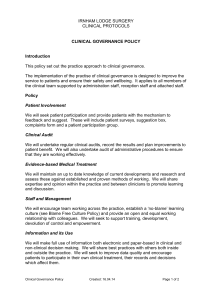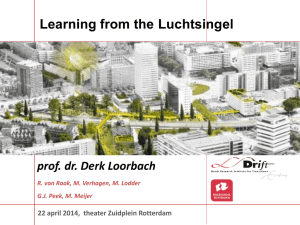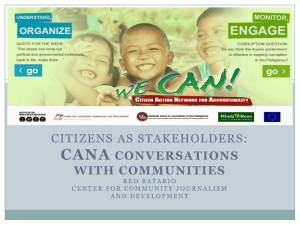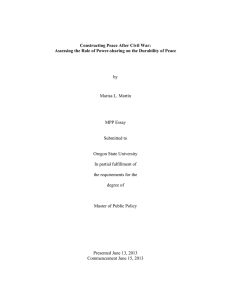4 Questions of Governance - Municipal Association of Victoria
advertisement
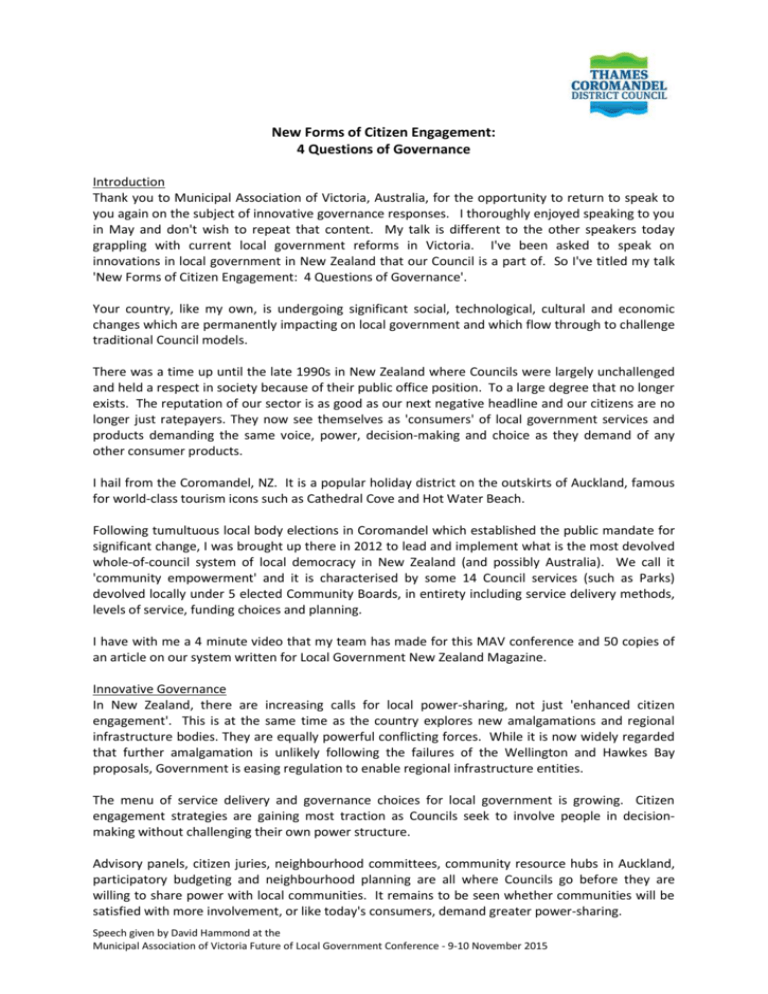
New Forms of Citizen Engagement: 4 Questions of Governance Introduction Thank you to Municipal Association of Victoria, Australia, for the opportunity to return to speak to you again on the subject of innovative governance responses. I thoroughly enjoyed speaking to you in May and don't wish to repeat that content. My talk is different to the other speakers today grappling with current local government reforms in Victoria. I've been asked to speak on innovations in local government in New Zealand that our Council is a part of. So I've titled my talk 'New Forms of Citizen Engagement: 4 Questions of Governance'. Your country, like my own, is undergoing significant social, technological, cultural and economic changes which are permanently impacting on local government and which flow through to challenge traditional Council models. There was a time up until the late 1990s in New Zealand where Councils were largely unchallenged and held a respect in society because of their public office position. To a large degree that no longer exists. The reputation of our sector is as good as our next negative headline and our citizens are no longer just ratepayers. They now see themselves as 'consumers' of local government services and products demanding the same voice, power, decision-making and choice as they demand of any other consumer products. I hail from the Coromandel, NZ. It is a popular holiday district on the outskirts of Auckland, famous for world-class tourism icons such as Cathedral Cove and Hot Water Beach. Following tumultuous local body elections in Coromandel which established the public mandate for significant change, I was brought up there in 2012 to lead and implement what is the most devolved whole-of-council system of local democracy in New Zealand (and possibly Australia). We call it 'community empowerment' and it is characterised by some 14 Council services (such as Parks) devolved locally under 5 elected Community Boards, in entirety including service delivery methods, levels of service, funding choices and planning. I have with me a 4 minute video that my team has made for this MAV conference and 50 copies of an article on our system written for Local Government New Zealand Magazine. Innovative Governance In New Zealand, there are increasing calls for local power-sharing, not just 'enhanced citizen engagement'. This is at the same time as the country explores new amalgamations and regional infrastructure bodies. They are equally powerful conflicting forces. While it is now widely regarded that further amalgamation is unlikely following the failures of the Wellington and Hawkes Bay proposals, Government is easing regulation to enable regional infrastructure entities. The menu of service delivery and governance choices for local government is growing. Citizen engagement strategies are gaining most traction as Councils seek to involve people in decisionmaking without challenging their own power structure. Advisory panels, citizen juries, neighbourhood committees, community resource hubs in Auckland, participatory budgeting and neighbourhood planning are all where Councils go before they are willing to share power with local communities. It remains to be seen whether communities will be satisfied with more involvement, or like today's consumers, demand greater power-sharing. Speech given by David Hammond at the Municipal Association of Victoria Future of Local Government Conference - 9-10 November 2015 While Council staff are well versed in all these different methods, what they find hard is to have the conversation with governance about governance's values and principles which guide the approaches to use. Four Questions of Governance To choose either engagement or power-sharing strategies, I believe there are four key questions of governance to ask first. No matter what size of your Council, I call these four questions, 'Governance Appetites'. 1. Appetite for Localism To what extent does your Council hold to the principle that local government should be about decisions being made at a local level by local people about issues and services that affect local communities. If you have a high appetite for localism, you willingly explore alternative service delivery methods and alternative funding methods. And you will be relaxed that in some areas a library will be run by a community group and in other areas publicly funded - because the variation reflects local preferences. 2. Appetite for Subsidiarity Subsidiarity is a principle which extends localism. It holds that public services should be delivered locally first and foremost. And the overflows which can't be are 'bumped' up to a District or city-wide, regional/state, or national level. For your Council, you start by asking how we can deliver locally, not why we shouldn't. In my Council, Parks were returned under local Community Boards. However, economies of scale meant that a whole-of-District contract was still retained. Local level-of-service preferences were simply built into the district-wide contract. This is an example of subsidiarity. 3. Appetite for Power-Sharing Are your citizens asking for more input / consultation or are they seeking more power at a local level? And are you willing to share power? If citizens simply want more of a say then it is reasonable that Councils explore more citizen engagement or participatory methods. If citizens are demanding you share power then, like Coromandel you will look at restructuring governance and management to deliver. 4. Appetite for elected accountability How important is it to your Council that decisions are made over resources, service methods, levels-of-service and funding by democratically elected people who are accountable back to the ballot box. In my Council, we would not entertain non-elected citizen advisory boards making decisions over resources as they have no accountability to electors. But how your Council answers this will determine whether you support regional infrastructure companies, would transfer public assets to companies, or would use citizen advisory panels for anything more than simply... citizen advice. In summary, the keys to responding to today's 'consumer' demands on local government are to understand the drivers of change, ask the right questions, and exercise a willingness to change. Thank you. Speech given by David Hammond at the Municipal Association of Victoria Future of Local Government Conference - 9-10 November 2015

